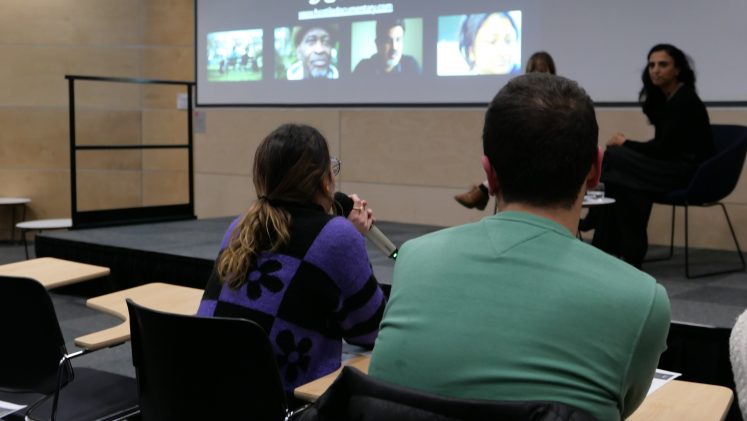 Before I started teaching at LSE in January, I had the impression that the academics and researchers around the school were totally social media savvy – prolific tweeters like Charlie Beckett and top blogs like LSE Impact are high up on my follow list.
Before I started teaching at LSE in January, I had the impression that the academics and researchers around the school were totally social media savvy – prolific tweeters like Charlie Beckett and top blogs like LSE Impact are high up on my follow list.
It turned out the impression was, ahem, a little misleading. A good proportion of the people I have come across may be brilliant in their field, but when it comes to using the interwebs, tend to sound like the querulous 1960s judge asking ‘What is a Beatle?’ (‘I don’t twitter’). Much of life is spent within the hallowed paywalls of academic journals (when I pointed out that no-one outside academia reads them, the baffled response seemed to be along the lines of ‘and your point is?’).
So why should they rethink? Here are some initial arguments, confined to blogs and twitter (the only bits of social media I engage with). I’m sure there are lots of others – feel free to add:
- Remember that a blog is a ‘web log’, i.e. an online diary. Regular blogging builds up a handy, time-saving archive. I’ve been blogging daily since 2008. OK, that’s a little excessive, but what that means is that essentially I have a download of my brain activity over the last 7 years – almost every book and papers I’ve read, conversations and debates. Whenever anyone wants to consult me, I have a set of links I can send (which saves huge amounts of time). And raw material for the next presentation, paper or book.
- Making sure someone reads your research. Look no further than the excellent LSE Impact blog for evidence: here’s a quick search of their posts:
Patrick Dunleavy argues blogging and tweeting from multi-author blogs especially is a great way to build knowledge of your work, to grow readership of useful articles and research reports, to build up citations, and to foster debate across academia, government, civil society and the public in general.
World Bank research on economics blogging (with regressions, natch) concluded:
‘Blogging about a paper causes a large increase in the number of abstract views and downloads in the same month: an average impact of an extra 70-95 abstract views in the case of Aid Watch (now sadly defunct) and Chris Blattman, 135 for Economix, 300 for Marginal Revolution, and 450-470 for Freakonomics and Krugman. [see regression table here]
These increases are massive compared to the typical abstract views and downloads these papers get- one blog post in Freakonomics is equivalent to 3 years of abstract views! However, only a minority of readers click through – we estimate 1-2% of readers of the more popular blogs click on the links to view the abstracts, and 4% on a blog like Chris Blattman that likely has a more specialized (research-focused) readership.’
LSE Impact for twitter users includes:
- The effect of twitter on publication downloads
- A short guide to Using Twitter in university research, teaching, and impact activities
- It gives you a bit of soft power (let’s not exaggerate this, but check out slide 15 of this research presentation for some evidence). Blogs are now an established part of the chattersphere/public conversation, so you get a chance to put your favourite ideas out there, and spin those of others. People in your organization may well read your blogs and tweets even if they don’t read your emails.
- Blogging is a great antidote to that feeling of anticlimax and futility that comes after you send off the paper or the book manuscript, and suddenly the true indifference of the universe becomes apparent. You can keep discussing and communicating with interesting people, and keep the existential crisis at bay.
- And don’t forget the free books, also known as ‘review copies’.
- And the chance to publicly insult your enemies (not relevant in my case, obvs, as I don’t have any).

“I Don’t Have Time”
The counter-argument is bound to be ‘we don’t have time’, but if you take too long, that probably means the blog won’t be very accessible. Reading a blog should be like listening to the person talk, but with links. This post took me precisely 30 minutes to write, including the ‘research’.
Maybe twitter’s apparent time-efficiency explains why Twitter seems better represented than blogging (though I only found this out by writing this post and circulating it!). In the International Development faculty (including honorary fellows and Professors in Practice) we have Owen Barder, Pritish Behuria, Mayling Birney, Benjamin Chemouni, Jean Paul Faguet, Keith Hart, Sohini Kar, Silvia Masiero, Laura Mann, Danny Quah, Rajesh Venugopal, and Kevin Watkins. Did I miss anyone? Oh yes, me.
If you’re interested in dipping your toe in the social media ocean, here are some tips for bloggers on international development and a previous effort to convince sceptics. But the best thing is just to try it and see. At the very least, follow Chris Blattman to see how it’s done.
Keith (k.mcdonald@lse.ac.uk) is currently the Managing Editor of the International Development blog. Get in touch if you want to have a go.
Related Posts
   |






This week Vox.com’s Ezra Klein spoke at the World Bank about popularizing research. Video here, but some takeaways:
Lots of research is inherently interesting – he makes a living from “arbitrage” of research the original authors haven’t popularized.
Many people forward based on just the headline or quick skim. Put the interesting/surprising thing up front, ideally in the headline.
PR company email blasts go to spam. A personal email from the actual researcher with heads up on a new paper carries much more weight.
Hi! Keith
I read your article on why academics should take blog and lods social media seriously.
Excellent!
My blog:
http://astronomiaenmonagas.blogspot.com/
Since 2010 I write there
Regards!
—
Prof. Freddy J. Oropeza R.
Física – Astronomía – Ciencias Espaciales
Coordinador del Área de Astronomía y Matemáticas
Especialidad de Ciencias de La Tierra
Universidad Pedagógica Experimental Libertador – Instituto Pedagógico Maturín
Maturín, Monagas
Venezuela
…and don’t forget the prolific live-tweeting that our own LSE Director @CraigJCalhoun undertakes at events. See practically any Storify, e.g., https://storify.com/LSEalumni/lse-asia-forum-in-hong-kong
There’s an article by Rohan Maitzen from 2012 called ‘Scholarship 2.0: Blogging and/as Academic Practice’ in the Journal of Victorian Culture, which shows how broad the disciplinary debate is about blogging.
I just want to highlight two prescient points she makes that aren’t covered here in the same terms:
1. “Academic publishing proceeds glacially; I have learned the stimulation of immediacy.” This falls between DG’s reasons 3 and 4, I think. It was commonly argued a few years ago that blogging eschewed the hallowed process of peer-review and that it compromised new ideas once they were brought into the public. The value of the counter-argument – that blogging allows you to time-stamp and publish ideas first while academic publishing crawls along – was never shouted so vociferously.
2. Knowing what blogging is and what is isn’t. She says “Perhaps I sound like an evangelist for blogging as the ‘scholarship of the future’. I am not. I do not think every academic should blog, and I certainly do not think blogging should replace all the other ways in which we carry on our work as intellectuals and educators. Blogging will neither suit nor serve every academic nor every academic purpose. I am convinced, though, that academic blogging can and should have an acknowledged place in the overall ecology of scholarship. It does contribute – and should be recognized as contributing – to both the intellectual and the institutional goals of our universities.” Amen to that.
Glad to see this. A few relevant posts (taking advantage of your “downloaded brain” point)
http://www.aguanomics.com/2008/12/public-or-academic-intellectual.html
http://www.aguanomics.com/2009/10/say-everything-review.html
http://www.aguanomics.com/2012/02/blogging-ideas-academic-output-and.html